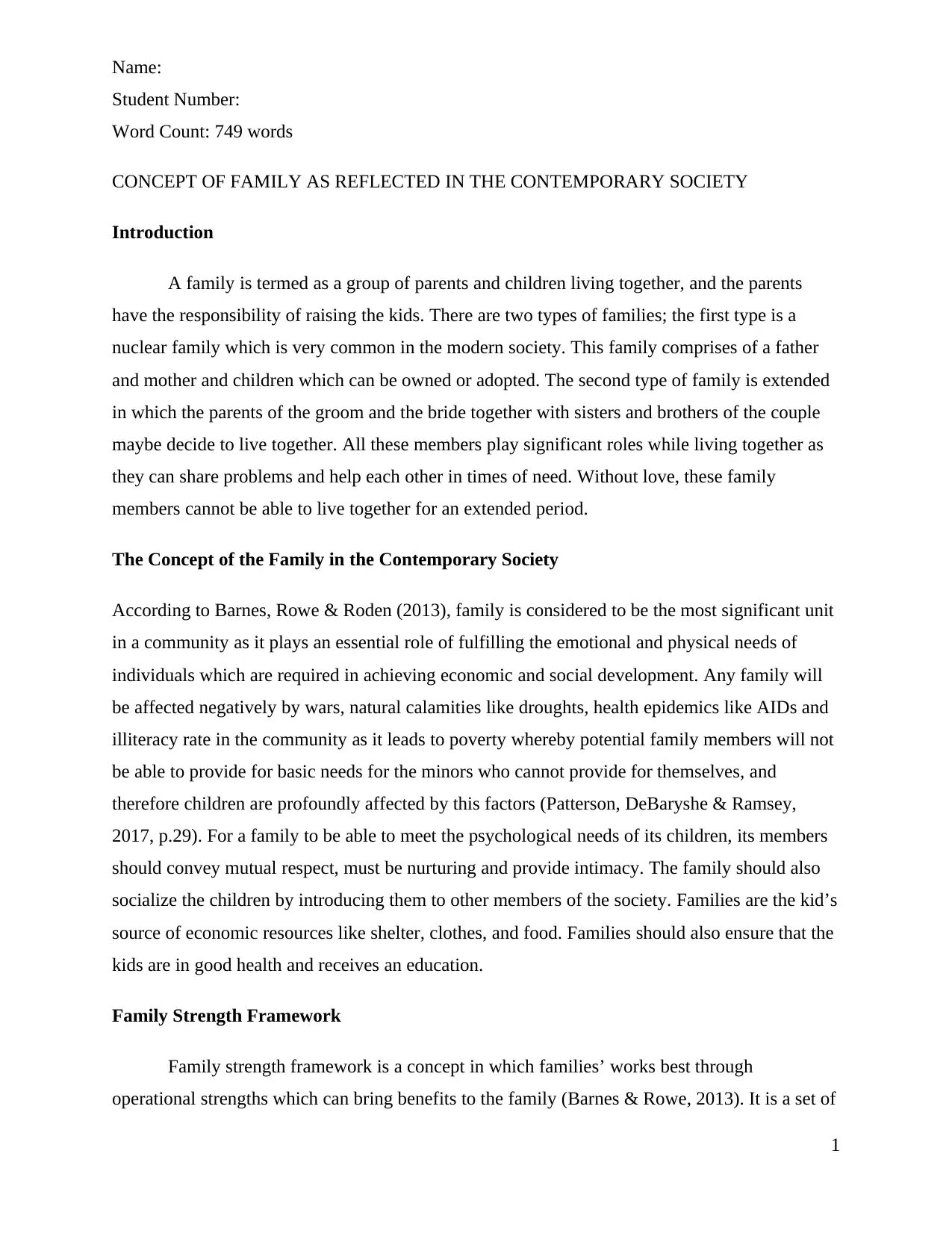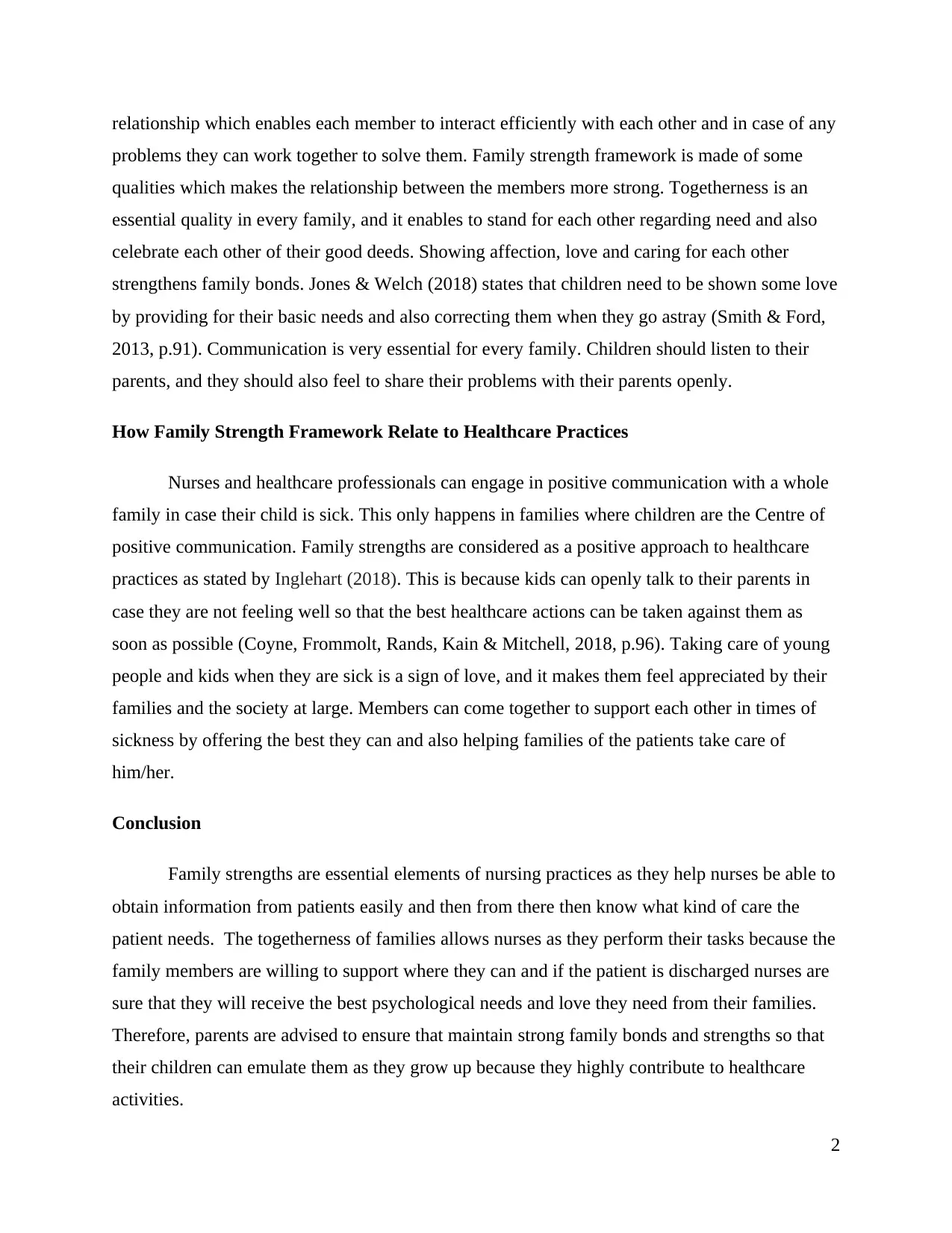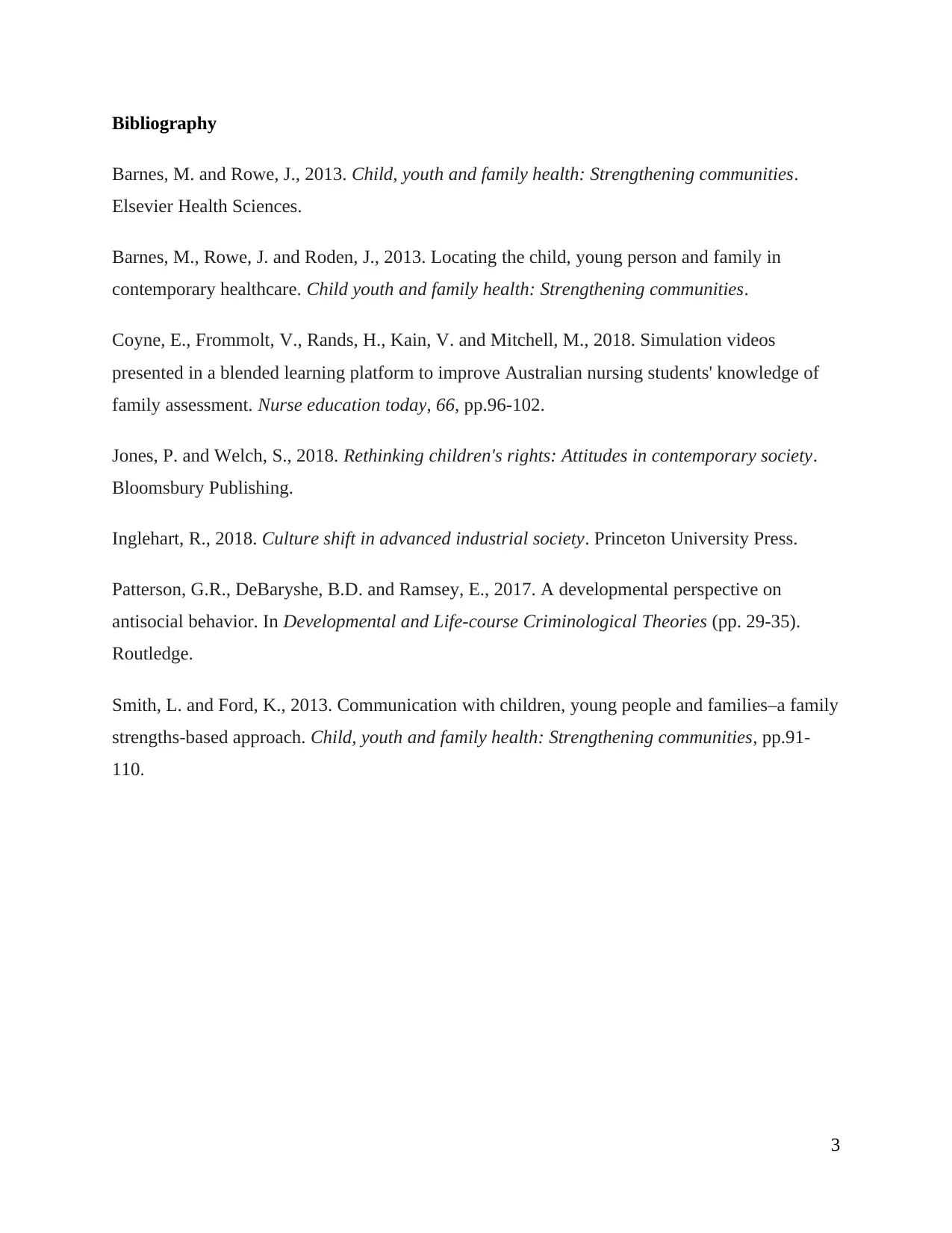NUR212 Task 1b: Reflecting on Family's Role in Health Outcomes
VerifiedAdded on 2023/06/08
|3
|1066
|252
Essay
AI Summary
This essay explores the concept of family in contemporary society, highlighting the shift towards nuclear families and the importance of family in fulfilling emotional and physical needs. It discusses how factors like war, poverty, and health epidemics can negatively impact families. The essay emphasizes the family strength framework, focusing on qualities like togetherness, affection, and communication, and how these relate to healthcare practices, particularly in nursing. It concludes that strong family bonds are essential for positive healthcare outcomes, as they enable better communication between patients and healthcare providers and provide crucial support during illness. Desklib offers a platform for students to access similar essays and study resources.

Name:
Student Number:
Word Count: 749 words
CONCEPT OF FAMILY AS REFLECTED IN THE CONTEMPORARY SOCIETY
Introduction
A family is termed as a group of parents and children living together, and the parents
have the responsibility of raising the kids. There are two types of families; the first type is a
nuclear family which is very common in the modern society. This family comprises of a father
and mother and children which can be owned or adopted. The second type of family is extended
in which the parents of the groom and the bride together with sisters and brothers of the couple
maybe decide to live together. All these members play significant roles while living together as
they can share problems and help each other in times of need. Without love, these family
members cannot be able to live together for an extended period.
The Concept of the Family in the Contemporary Society
According to Barnes, Rowe & Roden (2013), family is considered to be the most significant unit
in a community as it plays an essential role of fulfilling the emotional and physical needs of
individuals which are required in achieving economic and social development. Any family will
be affected negatively by wars, natural calamities like droughts, health epidemics like AIDs and
illiteracy rate in the community as it leads to poverty whereby potential family members will not
be able to provide for basic needs for the minors who cannot provide for themselves, and
therefore children are profoundly affected by this factors (Patterson, DeBaryshe & Ramsey,
2017, p.29). For a family to be able to meet the psychological needs of its children, its members
should convey mutual respect, must be nurturing and provide intimacy. The family should also
socialize the children by introducing them to other members of the society. Families are the kid’s
source of economic resources like shelter, clothes, and food. Families should also ensure that the
kids are in good health and receives an education.
Family Strength Framework
Family strength framework is a concept in which families’ works best through
operational strengths which can bring benefits to the family (Barnes & Rowe, 2013). It is a set of
1
Student Number:
Word Count: 749 words
CONCEPT OF FAMILY AS REFLECTED IN THE CONTEMPORARY SOCIETY
Introduction
A family is termed as a group of parents and children living together, and the parents
have the responsibility of raising the kids. There are two types of families; the first type is a
nuclear family which is very common in the modern society. This family comprises of a father
and mother and children which can be owned or adopted. The second type of family is extended
in which the parents of the groom and the bride together with sisters and brothers of the couple
maybe decide to live together. All these members play significant roles while living together as
they can share problems and help each other in times of need. Without love, these family
members cannot be able to live together for an extended period.
The Concept of the Family in the Contemporary Society
According to Barnes, Rowe & Roden (2013), family is considered to be the most significant unit
in a community as it plays an essential role of fulfilling the emotional and physical needs of
individuals which are required in achieving economic and social development. Any family will
be affected negatively by wars, natural calamities like droughts, health epidemics like AIDs and
illiteracy rate in the community as it leads to poverty whereby potential family members will not
be able to provide for basic needs for the minors who cannot provide for themselves, and
therefore children are profoundly affected by this factors (Patterson, DeBaryshe & Ramsey,
2017, p.29). For a family to be able to meet the psychological needs of its children, its members
should convey mutual respect, must be nurturing and provide intimacy. The family should also
socialize the children by introducing them to other members of the society. Families are the kid’s
source of economic resources like shelter, clothes, and food. Families should also ensure that the
kids are in good health and receives an education.
Family Strength Framework
Family strength framework is a concept in which families’ works best through
operational strengths which can bring benefits to the family (Barnes & Rowe, 2013). It is a set of
1
Paraphrase This Document
Need a fresh take? Get an instant paraphrase of this document with our AI Paraphraser

relationship which enables each member to interact efficiently with each other and in case of any
problems they can work together to solve them. Family strength framework is made of some
qualities which makes the relationship between the members more strong. Togetherness is an
essential quality in every family, and it enables to stand for each other regarding need and also
celebrate each other of their good deeds. Showing affection, love and caring for each other
strengthens family bonds. Jones & Welch (2018) states that children need to be shown some love
by providing for their basic needs and also correcting them when they go astray (Smith & Ford,
2013, p.91). Communication is very essential for every family. Children should listen to their
parents, and they should also feel to share their problems with their parents openly.
How Family Strength Framework Relate to Healthcare Practices
Nurses and healthcare professionals can engage in positive communication with a whole
family in case their child is sick. This only happens in families where children are the Centre of
positive communication. Family strengths are considered as a positive approach to healthcare
practices as stated by Inglehart (2018). This is because kids can openly talk to their parents in
case they are not feeling well so that the best healthcare actions can be taken against them as
soon as possible (Coyne, Frommolt, Rands, Kain & Mitchell, 2018, p.96). Taking care of young
people and kids when they are sick is a sign of love, and it makes them feel appreciated by their
families and the society at large. Members can come together to support each other in times of
sickness by offering the best they can and also helping families of the patients take care of
him/her.
Conclusion
Family strengths are essential elements of nursing practices as they help nurses be able to
obtain information from patients easily and then from there then know what kind of care the
patient needs. The togetherness of families allows nurses as they perform their tasks because the
family members are willing to support where they can and if the patient is discharged nurses are
sure that they will receive the best psychological needs and love they need from their families.
Therefore, parents are advised to ensure that maintain strong family bonds and strengths so that
their children can emulate them as they grow up because they highly contribute to healthcare
activities.
2
problems they can work together to solve them. Family strength framework is made of some
qualities which makes the relationship between the members more strong. Togetherness is an
essential quality in every family, and it enables to stand for each other regarding need and also
celebrate each other of their good deeds. Showing affection, love and caring for each other
strengthens family bonds. Jones & Welch (2018) states that children need to be shown some love
by providing for their basic needs and also correcting them when they go astray (Smith & Ford,
2013, p.91). Communication is very essential for every family. Children should listen to their
parents, and they should also feel to share their problems with their parents openly.
How Family Strength Framework Relate to Healthcare Practices
Nurses and healthcare professionals can engage in positive communication with a whole
family in case their child is sick. This only happens in families where children are the Centre of
positive communication. Family strengths are considered as a positive approach to healthcare
practices as stated by Inglehart (2018). This is because kids can openly talk to their parents in
case they are not feeling well so that the best healthcare actions can be taken against them as
soon as possible (Coyne, Frommolt, Rands, Kain & Mitchell, 2018, p.96). Taking care of young
people and kids when they are sick is a sign of love, and it makes them feel appreciated by their
families and the society at large. Members can come together to support each other in times of
sickness by offering the best they can and also helping families of the patients take care of
him/her.
Conclusion
Family strengths are essential elements of nursing practices as they help nurses be able to
obtain information from patients easily and then from there then know what kind of care the
patient needs. The togetherness of families allows nurses as they perform their tasks because the
family members are willing to support where they can and if the patient is discharged nurses are
sure that they will receive the best psychological needs and love they need from their families.
Therefore, parents are advised to ensure that maintain strong family bonds and strengths so that
their children can emulate them as they grow up because they highly contribute to healthcare
activities.
2

Bibliography
Barnes, M. and Rowe, J., 2013. Child, youth and family health: Strengthening communities.
Elsevier Health Sciences.
Barnes, M., Rowe, J. and Roden, J., 2013. Locating the child, young person and family in
contemporary healthcare. Child youth and family health: Strengthening communities.
Coyne, E., Frommolt, V., Rands, H., Kain, V. and Mitchell, M., 2018. Simulation videos
presented in a blended learning platform to improve Australian nursing students' knowledge of
family assessment. Nurse education today, 66, pp.96-102.
Jones, P. and Welch, S., 2018. Rethinking children's rights: Attitudes in contemporary society.
Bloomsbury Publishing.
Inglehart, R., 2018. Culture shift in advanced industrial society. Princeton University Press.
Patterson, G.R., DeBaryshe, B.D. and Ramsey, E., 2017. A developmental perspective on
antisocial behavior. In Developmental and Life-course Criminological Theories (pp. 29-35).
Routledge.
Smith, L. and Ford, K., 2013. Communication with children, young people and families–a family
strengths-based approach. Child, youth and family health: Strengthening communities, pp.91-
110.
3
Barnes, M. and Rowe, J., 2013. Child, youth and family health: Strengthening communities.
Elsevier Health Sciences.
Barnes, M., Rowe, J. and Roden, J., 2013. Locating the child, young person and family in
contemporary healthcare. Child youth and family health: Strengthening communities.
Coyne, E., Frommolt, V., Rands, H., Kain, V. and Mitchell, M., 2018. Simulation videos
presented in a blended learning platform to improve Australian nursing students' knowledge of
family assessment. Nurse education today, 66, pp.96-102.
Jones, P. and Welch, S., 2018. Rethinking children's rights: Attitudes in contemporary society.
Bloomsbury Publishing.
Inglehart, R., 2018. Culture shift in advanced industrial society. Princeton University Press.
Patterson, G.R., DeBaryshe, B.D. and Ramsey, E., 2017. A developmental perspective on
antisocial behavior. In Developmental and Life-course Criminological Theories (pp. 29-35).
Routledge.
Smith, L. and Ford, K., 2013. Communication with children, young people and families–a family
strengths-based approach. Child, youth and family health: Strengthening communities, pp.91-
110.
3
⊘ This is a preview!⊘
Do you want full access?
Subscribe today to unlock all pages.

Trusted by 1+ million students worldwide
1 out of 3
Related Documents
Your All-in-One AI-Powered Toolkit for Academic Success.
+13062052269
info@desklib.com
Available 24*7 on WhatsApp / Email
![[object Object]](/_next/static/media/star-bottom.7253800d.svg)
Unlock your academic potential
Copyright © 2020–2026 A2Z Services. All Rights Reserved. Developed and managed by ZUCOL.





